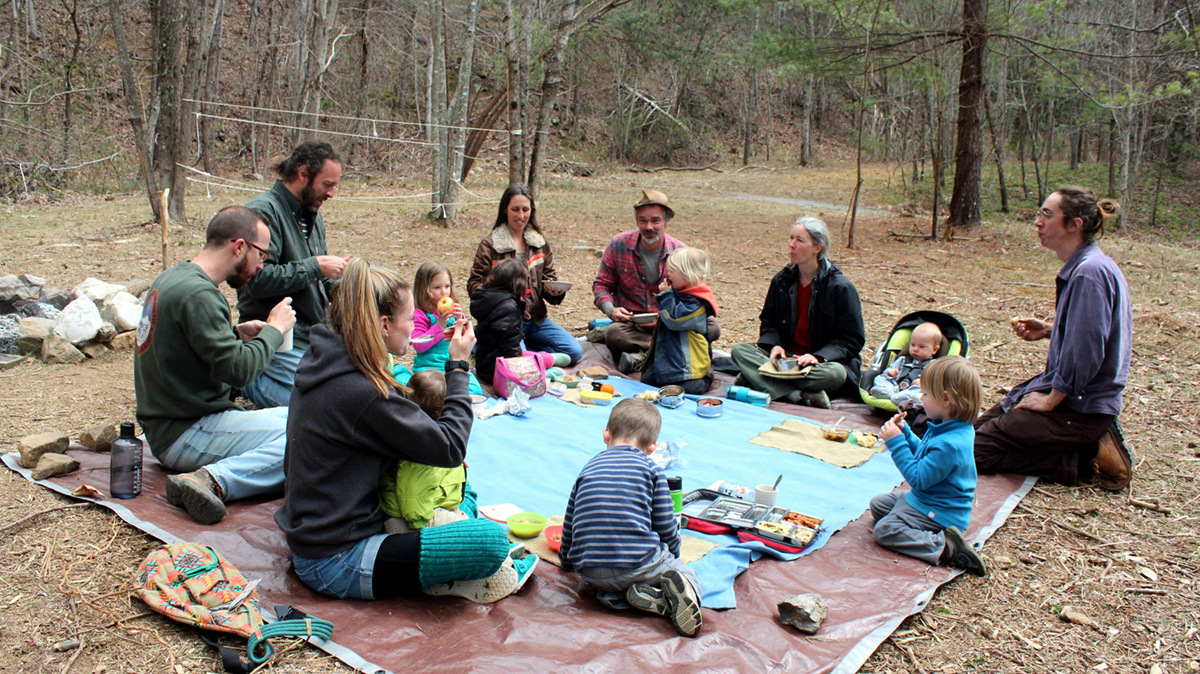
Children helping make soup. Photo by Krysta Denzer
Reconnecting to the Natural World
By Emma Castleberry
A group of mixed-age children is gathered at the top of a grassy hill. They pass around a bowl of crunchy, baked broadleaf plantain leaves that they identified and harvested the previous day. A small dog mills between the clumps of kids, looking for crumbs and scraps. A pair of girls are tying strands of ivy together to make crowns. The ground is wet and many of the kids are, too.
This is a typical scene at the Asheville Forest School (AFS). AFS offers weekly summer camps at the Songbird Sanctuary Community Center in Candler. I was able to visit one of these camps on a rainy day in June.
One of the camp’s nature connection mentors, Amanda Phelan, is helping the children identify bird calls and telling stories about snakes and songbirds she has interacted with at the Sanctuary.
“This kind of work helps raise children with responsibility for the earth and facilitates learning in natural ways without forcing education,” she says. “They develop a passionate responsibility to protect the earth after connecting to nature.”
AFS is modeled after forest kindergartens, a European early childhood education system that made its way to the US in the 1990s. As the name suggests, the natural world is at the heart of any forest kindergarten. Students are equipped with proper clothing and sometimes a primitive shelter, but they spend all of their time outside, regardless of weather conditions. Children might work with fire, knives and plant identification—skills that the traditional American parent might find advanced for the students’ young age.
“In this country, the mainstream understanding about young children is that they need to be cared for, protected from every possible harm and taught information,” says Paul Beich, founder of the Asheville Forest School. “We are offering to do much more than just protect, care for and teach children. We do all those things, but we are also helping children to get to know themselves and the world they live in.”
In November of 2016, Pat and Kerry Lindsay donated eight acres on Town Mountain for the AFS to use as their site. The school opened its (metaphorical) doors in December of 2016 with a small class of four boys, ages three and four. Shortly thereafter, enrollment expanded to include some girls and some five year olds.
Laura Graziano was one of the first to enroll her three year old at the Asheville Forest School last winter. Graziano feels that the school addresses a growing problem with young people.
“Children are growing up with a feeling of separation from the earth,” she says. “We all know that humans are connected to the natural world. The community will benefit from youth who understand the deep bond we hold with our planet and will do their best to care for it.”
Currently, the school operates exclusively on enrollment fees paid by parents like Graziano. But Beich says that model doesn’t allow the school to achieve its true mission.
“When our only income is fees, we are not serving all sectors of the community,” he says. “With funding, we can offer scholarships so that this is truly available to all families.”
Beich and his team have built AFS on a mostly volunteer basis with little financial compensation.
“We are a group of people doing this work because we passionately believe in its value for children, families, the community and the Earth herself,” he says.
The AFS has moved to a West Asheville site for the 2017–2018 school year in the hopes that this location will be more accessible and appealing to local families. The ultimate goal of the Asheville Forest School is to be more than a single school serving a few students.
Beich’s vision is a collection of multiple forest schools throughout the area that can act as a model for the rest of the country.
“We believe this is the early childhood education of the future and an essential cornerstone of the much more healthy, earth-friendly culture that many of us envision,” he says. “We’re in this for the very long-term.”
Asheville Forest School is located at the Unity Church of Asheville at 130 Shelburne Road in West Asheville and is now accepting applications for the 2017–2018 school year. For more information about AFS and how you can help, or to apply for enrollment, visit their website: ashevilleforestschool.org.






